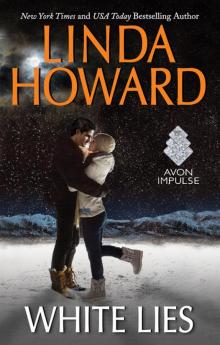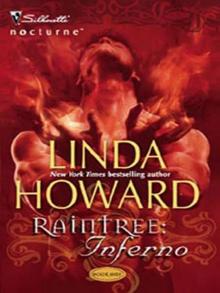- Home
- Linda Howard
The Complete Mackenzie Collection
The Complete Mackenzie Collection Read online
The Complete Mackenzies Collection
Mackenzie’s Mountain
Mackenzie’s Mission
Mackenzie’s Pleasure
A Game of Chance
Mackenzie’s Magic
Contents
Mackenzie’s Mountain
By Linda Howard
Mackenzie’s Mission
By Linda Howard
Mackenzie’s Pleasure
By Linda Howard
A Game of Chance
By Linda Howard
Mackenzie’s Magic
By Linda Howard
Mackenzie’s Mountain
By Linda Howard
Contents
Chapter One
Chapter Two
Chapter Three
Chapter Four
Chapter Five
Chapter Six
Chapter Seven
Chapter Eight
Chapter Nine
Chapter Ten
Chapter Eleven
Chapter Twelve
Epilogue
Chapter One
He needed a woman. Bad.
Wolf Mackenzie spent a restless night, with the bright full moon throwing its silver light on the empty pillow beside him. His body ached with need, the sexual need of a healthy man, and the passing hours only intensified his frustration. Finally he got out of bed and walked naked to the window, his big body moving with fluid power. The wooden floor was icy beneath his bare feet but he welcomed the discomfort, for it cooled the undirected desire that heated his blood.
The colorless moonlight starkly etched the angles and planes of his face, living testimony to his heritage. Even more than the thick black hair worn long to touch his shoulders, even more than the heavy-lidded black eyes, his face proclaimed him Indian. It was in his high, prominent cheekbones and broad forehead, his thin lips and high-bridged nose. Less obvious, but just as fierce, was the Celtic heritage from his father, only one generation removed from the Scottish Highlands. It had refined the Indian features inherited from his mother into a face like a blade, as clean and sharply cut as it was strong. In his veins ran the blood of two of the most warlike peoples in the history of the world, Comanche and Celt. He had been a natural warrior, a fact soon discovered by the military when he had enlisted.
He was also a sensualist. He knew his own nature well, and though he controlled it, there were times when he needed a woman. He usually visited Julie Oakes at those times. She was a divorced woman, several years older, who lived in a small town fifty miles distant. Their arrangement had lasted five years; neither Wolf nor Julie was interested in marriage, but both had needs, and they liked each other. Wolf tried not to visit Julie too often, and he took care that he was never seen entering her house; he accepted the fact, unemotionally, that her neighbors would be outraged if they knew she slept with an Indian. And not just any Indian; a rape charge stuck to a man forever.
The next day was a Saturday. There would be the normal chores, and he had to pick up a load of fencing materials in Ruth, the small town just at the base of his mountain, but Saturday nights were traditionally for howling. He wouldn’t howl, but he’d visit Julie and burn off his sexual tension in her bed.
The night was turning colder, and low heavy clouds were moving in. He watched until they obscured the moon, knowing they meant new snow. He didn’t want to return to his empty bed. His face was impassive, but his loins ached. He needed a woman.
Mary Elizabeth Potter had numerous small chores to occupy her time that Saturday morning, but her conscience wouldn’t let her rest until she had talked to Joe Mackenzie. The boy had dropped out of school two months before, a month before she had arrived to take the place of a teacher who had abruptly quit. No one had mentioned the boy to Mary, but she’d run across his school record, and curiosity had led her to read it. In the small town of Ruth, Wyoming, there weren’t that many students in school, and she had thought she’d met them all. In fact, there were less than sixty students, but the graduation rate was almost one hundred percent, so any dropout was unusual. When she had read Joe Mackenzie’s record, she’d been stunned. The boy had been at the top of his class, with straight A’s in all subjects. Students who did poorly would get discouraged and drop out, but every teaching instinct she had was outraged that such an outstanding student would just quit. She had to talk to him, try to make him understand how important it was to his future that he continue his education. Sixteen was so young to make a mistake that would haunt him the rest of his life. She wouldn’t be able to sleep at night until she had done her best to talk him into returning.
It had snowed again during the night and had turned bitterly cold. The cat meowed plaintively as it wound around her ankles, as if complaining about the weather. “I know, Woodrow,” she consoled the animal. “The floor must be cold to your feet.” She could sympathize. She didn’t think her feet had been warm since she had moved to Wyoming.
Before another winter came, she promised herself, she would own a pair of warm, sturdy boots, fur-lined and waterproof, and she would stomp about in the snow as if she’d been doing it all her life, like a native. Actually she needed the boots now, but the expenses of moving had wiped out her cash reserves, and the teachings of her thrifty aunt prevented her from buying the boots on credit.
Woodrow meowed again as she put on the warmest, most sensible shoes she owned, the ones she privately called her. “old maid schoolteacher shoes.” Mary paused to scratch behind his ears, and his back arched in ecstasy. She had inherited him with the house, which the school board had arranged for her to live in; the cat, like the house, wasn’t much. She had no idea how old Woodrow was, but both he and the house looked a little run-down. Mary had always resisted owning a cat—it seemed the crowning touch to an old maid’s life—but finally her fate had caught up with her. She was an old maid. Now she owned a cat. And wore old maid shoes. The picture was complete.
“Water seeks its own level,” she told the cat, who looked back at her with his unconcerned Egyptian gaze. “But what do you care? It doesn’t hurt you that my personal water level seems to stop at sensible shoes and cats.”
But as she looked in the mirror to make certain her hair was tidy, she sighed. Sensible shoes and cats were just her style, along with being pale, slight and nondescript. “Mousy” was a good word. Mary Elizabeth Potter had been born to be an old maid.
She was dressed as warmly as she could manage, unless she put on socks to wear with her sensible shoes, but she drew the line at that. Dainty white anklets with long ruffled skirts were one thing, but knee socks with a wool dress were something else entirely. She was willing to be dowdy for the sake of warmth; she was not willing to be tacky.
Well, there was no point in putting it off; it wasn’t going to get any warmer until spring. Mary braced herself for the shock of cold air on a system that still expected the warmth of Savannah. She had left her tidy little nest in Georgia for the challenge of a tiny school in Wyoming, for the excitement of a different way of life; she even admitted to a small yearning for adventure, though of course she never allowed it to surface. But somehow, she hadn’t taken the weather into account. She had been prepared for the snow, but not the bitter temperatures. No wonder there were so few students, she thought as she opened the door and gasped as the wind whipped at her. It was too cold for the adults to undress enough to do anything that might result in children!
She got snow in her sensible shoes when she walked to her car, a sensible two-door, midsize Chevrolet sedan, on which she had sensibly put a new set of snow tires when she had moved to Wyoming. According to the weather report on the radio that morning, the high would be seven degrees below zero. Mary sighed agai
n for the weather she had left behind in Savannah; it was March now, and spring would be in full swing, with flowers blooming in a riot of colors.
But Wyoming was beautiful, in a wild, majestic way. The soaring mountains dwarfed the puny man-made dwellings, and she had been told that, come spring, the meadows would be carpeted in wildflowers, and the crystal-clear creeks would sing their own special song. Wyoming was a different world from Savannah, and she was just a transplanted magnolia who was having trouble getting acclimated.
She had gotten instructions on how to get to the Mackenzie residence, though the information had been reluctantly given. It puzzled her that no one seemed interested in the boy, because the people in the little town had been friendly and helpful to her. The most direct comment she had gotten had been from Mr. Hearst, the grocery-store owner, who had muttered that “the Mackenzies aren’t worth your trouble.” But Mary considered any child worth her trouble. She was a teacher, and she meant to teach.
As she got into her sensible car, she could see the mountain called Mackenzie’s Mountain, as well as the narrow road that wound up its side like a ribbon, and she quailed inside. New snow tires notwithstanding, she wasn’t a confident driver in this strange environment. Snow was…well, snow was alien, not that she’d let it stop her from doing what she had set her mind on doing.
She was already shivering so hard that she could barely fit the key into the ignition. It was so cold! It actually hurt her nose and lungs to inhale. Perhaps she should wait for better weather before attempting the drive. She looked at the mountain again. Maybe in June all of the snow would have melted…but Joe Mackenzie had already been out of school for two months. Maybe in June the gap would seem insurmountable to him, and he wouldn’t make the effort. It might already be too late. She had to try, and she didn’t dare let even another week go by.
It was her habit to give herself pep talks whenever she was pushing herself to do something she found difficult, so she muttered under her breath as she began the drive. “It won’t seem so steep once I’m actually on the road. All uphill roads look vertical from a distance. It’s a perfectly negotiable road, otherwise the Mackenzies wouldn’t be able to get up and down, and if they can do it, I can do it.” Well, perhaps she could do it. Driving on snow was an acquired skill, one she hadn’t as yet mastered.
Determination kept her going. When she finally reached the mountain and the road tilted upward, her hands clenched on the steering wheel as she deliberately refrained from looking over the side at the increasing distance to the valley floor. Knowing how far it was possible for her to fall if she drove off the edge wouldn’t help her at all; in Mary’s opinion, that would be in the category of useless knowledge, of which she already had quite enough.
“I won’t slide,” she muttered. “I won’t go fast enough to lose control. This is like the Ferris wheel. I was certain I was going to fall out, but I didn’t.” She had ridden the Ferris wheel once, when she’d been nine years old, and no one had ever been able to talk her into trying it again. Carousels were more her style.
“The Mackenzies won’t mind if I talk to Joe,” she reassured herself in an attempt to get her mind off the drive. “Maybe he had trouble with a girlfriend, and that’s why he doesn’t want to go to school. At his age, it’s probably all blown over by now.”
Actually the drive wasn’t as bad as she’d feared. She began to breathe a little easier. The incline was more gradual than it had appeared, and she didn’t think she had too much farther to go. The mountain wasn’t as enormous as it had looked from the valley.
She was so intent on her driving that she didn’t notice the red light appear on the dash. She had no warning of overheating until steam suddenly erupted from beneath the hood, the frigid air instantly converting the mist into ice crystals on the windshield. Mary instinctively hit the brakes, then uttered a discreet oath when the wheels began sliding. Quickly she lifted her foot from the brake pedal, and the tires found traction again, but she couldn’t see. Closing her eyes, she prayed that she was still going in the right direction and let the car’s weight slow it to a stop.
The engine was hissing and bellowing like a dragon. Shaking in reaction, she turned off the ignition and got out of the car, gasping as the wind lashed her like an icy whip. The hood release mechanism was stiff from the bitter cold, but finally yielded, and she raised the hood to see what had happened, on the grounds that it would be nice to know what was wrong with the car even if she couldn’t fix it. It didn’t take a mechanic to see the problem: one of the water hoses had split, and hot water was spitting fitfully from the break.
Instantly she recognized the precariousness of her position. She couldn’t stay in the car, because she couldn’t let the motor run to keep her warm. The road was a private one, and the Mackenzies might not leave their ranch at all that day, or that entire weekend. It was too far, and too cold, for her to walk back to her own house. Her only option was to walk to the Mackenzie ranch and pray it wasn’t very far. Her feet were already numb.
She didn’t let herself dwell on the thought that she might not make it to the Mackenzie ranch, either. Instead she began to walk steadily up the road and tried to ignore the snow that got inside her shoes with each step.
She rounded a curve and lost sight of her car, but when she looked ahead there was still no sign of a house, or even a barn. She felt alone, as if she had been dropped into the middle of a wilderness. There was only the mountain and the snow, the vast sky and herself. The silence was absolute. It hurt to walk, and she found that she was sliding her feet instead of picking them up. She had gone fewer than two hundred yards.
Her lips trembled as she hugged herself in an effort to retain her body’s heat. Painful or not, she would just have to keep walking.
Then she heard the low growl of a powerful engine, and she stopped, relief welling in her so painfully that tears burned her eyes. She had a horror of crying in public and blinked them back. There was no sense in crying; she had been walking less than fifteen minutes and hadn’t been in any real danger at all. It was just her overactive imagination, as usual. She shuffled through the snow to the side of the road, to get out of the way, and waited for the approaching vehicle.
It came into view, a big black pickup with enormous tires. She could feel the driver’s eyes lock on her, and in spite of herself she ducked her head in embarrassment. Old maid schoolteachers weren’t accustomed to being the center of attention, and on top of that she felt a perfect fool. It must look as if she had gone for a stroll in the snow.
The truck slowed to a stop opposite her, and a man got out. He was big, and she instinctively disliked that. She disliked the way big men looked down at her, and she disliked being forced by sheer physical size to look up at them. Well, big or not, he was her rescuer. She wound her gloved fingers together and wondered what she should say. How did a person ask to be rescued? She had never hitched a ride before; it didn’t seem proper for a settled, respectable schoolteacher.
Wolf stared at the woman, astounded that anyone would be out in the cold while dressed so stupidly. What in hell was she doing on his mountain, anyway? How had she gotten here?
Suddenly he knew who she was; he’d overheard talk in the feed store about the new schoolteacher from someplace down South. He’d never seen anyone who looked more like a schoolteacher than this woman, and she was definitely dressed wrong for a Wyoming winter. Her blue dress and brown coat were so frumpy that she was almost a cliché; he could see wisps of light brown hair straggling out from under her scarf, and oversize horn-rimmed glasses dwarfed her small face. No makeup, not even lip gloss to protect her lips.
And no boots. Snow was caked almost to her knees.
He had surveyed her completely in two seconds and didn’t wait to hear what explanation she had for being on his mountain, if she intended to say anything at all. So far she hadn’t uttered a word, but continued to stare at him with a faintly outraged look on her face. He wondered if she considered it beneath her
to speak to an Indian, even to ask for help. Mentally he shrugged. What the hell, he couldn’t leave her out here.
Since she hadn’t spoken, he didn’t, either. He simply bent down and passed one arm behind her knees and the other behind her back, and lifted her as he would a child, ignoring her gasp. As he carried her to the truck, he reflected that she didn’t weigh much more than a child. He saw a flash of startled blue eyes behind the lenses of her glasses; then her arm passed around his neck and she was holding him in a convulsive grip, as if she were afraid he’d drop her.
He shifted her weight so he could open the passenger door and deposited her on the seat, then briskly wiped the snow from her feet and legs as well as he could. He heard her gasp again, but didn’t look up. When he had finished, he dusted the snow from his gloves and went around to climb behind the wheel.
“How long have you been walking?” he muttered reluctantly.
Mary started. She hadn’t expected his voice to be so deep that it almost reverberated. Her glasses had fogged from the truck’s heat, and she snatched them off, feeling her cold cheeks prickle as blood rushed to them. “I…not long,” she stammered. “About fifteen minutes. I blew a water hose. That is, my car did.”
Wolf glanced at her in time to see her hastily lower her eyes again and noticed her pinkened cheeks. Good, she was getting warm. She was flustered; he could see it in the way she kept twisting her fingers together. Did she think he was going to throw her down on the seat and rape her? After all, he was a renegade Indian, and capable of anything. Then again, the way she looked, maybe this was the most excitement she’d ever had.
They hadn’t been far from the ranch house and reached it in a few minutes. Wolf parked close to the kitchen door and got out; he circled the truck and reached the passenger door just as she opened it and began to slid down. “Forget it,” he said, and lifted her again. Her sliding motion had made her skirt ride halfway up her thighs. She hastily pushed the fabric down, but not before his black eyes had examined her slim legs, and the color deepened in her cheeks.

 Mr. Perfect
Mr. Perfect All the Queen's Men
All the Queen's Men Midnight Rainbow
Midnight Rainbow Diamond Bay
Diamond Bay Dying to Please
Dying to Please The Woman Left Behind
The Woman Left Behind Come Lie With Me
Come Lie With Me Drop Dead Gorgeous
Drop Dead Gorgeous To Die For
To Die For Ice
Ice Overload
Overload Shadow Woman
Shadow Woman Veil of Night
Veil of Night White Lies
White Lies Son of the Morning
Son of the Morning The Complete Mackenzies Collection
The Complete Mackenzies Collection Lake of Dreams
Lake of Dreams DeathAngel
DeathAngel Loving Evangeline
Loving Evangeline Burn
Burn Mackenzie's Magic
Mackenzie's Magic Against the Rules
Against the Rules Burn: A Novel
Burn: A Novel A Lady of the West
A Lady of the West Almost Forever
Almost Forever Open Season
Open Season Now You See Her
Now You See Her Prey
Prey Cry No More
Cry No More Sarah's Child
Sarah's Child Angel Creek
Angel Creek Death Angel
Death Angel Kill and Tell
Kill and Tell The Touch of Fire
The Touch of Fire Raintree: Inferno
Raintree: Inferno Killing Time
Killing Time Cover of Night
Cover of Night Tears of the Renegade
Tears of the Renegade Heartbreaker
Heartbreaker The Cutting Edge
The Cutting Edge All The Queen's Men cs-2
All The Queen's Men cs-2 Veil of Night: A Novel
Veil of Night: A Novel Blood Born
Blood Born The Complete Mackenzie Collection
The Complete Mackenzie Collection Mackenzie's Magic m-4
Mackenzie's Magic m-4 Mackenzie's Pleasure m-3
Mackenzie's Pleasure m-3 Raintree
Raintree A Game Of Chance m-5
A Game Of Chance m-5 Prey: A Novel
Prey: A Novel Lethal Attraction: Against the RulesFatal Affair
Lethal Attraction: Against the RulesFatal Affair The Raintree Box Set: Raintree: InfernoRaintree: HauntedRaintree: Sanctuary
The Raintree Box Set: Raintree: InfernoRaintree: HauntedRaintree: Sanctuary The Woman Left Behind: A Novel
The Woman Left Behind: A Novel Dream Man
Dream Man Frost Line
Frost Line Kill and Tell cs-1
Kill and Tell cs-1 Shadow Woman: A Novel
Shadow Woman: A Novel Mackenzie's Mission
Mackenzie's Mission Strangers in the Night
Strangers in the Night Running Blind
Running Blind